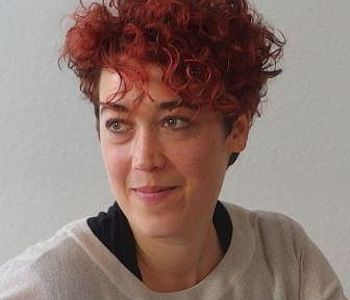Dr. Christine Barwick | Chercheuse associée
Ancien Membre
Position
:
Postdoctorante
|
Discipline
:
Sociologie
|
Biographie
Christine Barwick est sociologue, spécialisée dans la migration et mobilité internationale et l’européanisation par le bas. Ses recherches portes, par exemple, sur le transnationalisme et les mobilités, de la deuxième génération des migrants en Europe, et sur les migrants intra-européens. Christine a fait ses études en sciences sociales à l’Université Humboldt à Berlin ou elle a également fait son doctorat en sociologie (avec distinction) sur la mobilité sociale et le choix du quartier des Turques de la deuxième génération à Berlin. Avant son arrivée au Centre Marc Bloch, elle était chercheuse au Centre d`études européennes de Sciences Po Paris, où elle a mené une étude sur la mobilité intra-européenne des Français et Anglais, et sur la circulation des élites politiques et administratives en région Parisienne.
Actuellement, Christine travaille dans trois projets. Son projet d’habilitation s’occupe des mobilités internationales, le transnationalisme et l’identité de la deuxième génération Turque et Africaine à Berlin. Dans un autre projet elle focalise sur les expériences de la mobilité et installation des Britanniques à Berlin. Avec d’autres partenaires de l’Allemagne et de la France, elle fait un projet sur l’arrivée des réfugiés dans les villes moyennes en Allemagne et en France.
Pendant ses études, Christine a passé deux ans à New York, au New School for Social Research et le Graduate Center of the City University New York. Pour ses recherches, elle a reçu plusieurs prix, de l’Association Allemande de la Sociologie Urbaine pour la meilleure thèse, le prix Hartmut Häußermann ‘Soziale Stadt’, et un prix pour le meilleur essay rédigé par un jeune auteur de ‘International Journal of Urban and Regional Research’.
Sujet de recherche
Migration, Mobilité, Transnationalisme, Européanisation par le bas, Deuxième génération, Sociologie urbaine, marché de logement
Projets
Mobilities and identifications of Europe's second generation
Mobility and settlement of British nationals in Berlin
Towards a European middle class? Comparing middle-class French in London and British in Paris
New arrival spaces? Incorporation of refugees in French and German mid-size cities
New mobilities and identifcations of Europe's second generation
Societies worldwide are experiencing fundamental changes through large-scale migration and mobility across national borders. In our transnational world, the nation state is no longer the sole institution for the organization of people’s lives. Questions about the kind and extent of transnationalism, its determining factors and consequences, have been researched for different social groups by scholars of migrant transnationalism as well as scholars of horizontal Europeanization. Neither of these two research traditions, however, adequately addresses new mobilities and identifications of Europe’s second generation. Scholars of second generation transnationalism focus uniquely on the links between the Country of Residence and the ancestral home country. The political sociology of Europe analyses cross-border mobility and the emergence of collective identities, but disregards the second generation’s contributions to horizontal Europeanization. Particularly in Europe, where citizens have the right to free movement and distances between countries are short, we can expect that the second generation develops new forms of mobility that cover other than the parents’ home country. Drawing on the two research traditions, this project analyzes new mobilities and collective identifications, their influencing factors as well as effects, of Europe’s second generation. Employing a qualitative research design, including biographic-style interviews and documentary photography, the project captures the contributions to horizontal Europeanization of second-generation Turks and sub-Sahara Africans in Berlin and Paris. We will thus view the second generation, particularly those with parents who migrated from a non-European country, not only as migrants but as Europeans, who shape Europe through their practices, networks and identifications.
Publications
Barwick, C. & Gross, V. (2019): The circulation of public officials in a fragmented system: Urban governance networks in Paris. Public Administration. DOI: https://doi.org/10.1111/padm.12599 (accepted version).
Barwick, C. & Beaman, J. (2019): Living for the neighbourhood: marginalization and belonging for the second-generation in Berlin and Paris. Comparative Migration Studies, 7(1), 1-17.
Barwick, C. (2018): Social mix revisited: within- and across-neighborhood ties between ethnic minorities of differing socioeconomic backgrounds. Urban Geography, 39(6), 916-934.
Barwick, C. (2018): Transnationalism and Intra-European Mobility among Europe’s Second Generation: Review and Research Agenda. Global Networks, 18(4), 608-624.
Barwick, C. (2017): L'accueil des réfugiés à Berlin : une question clé aux multiples enjeux. Allemagne d’ajourd’hui, 221, 96-106.
Barwick, C. (2017): Are immigrants really lacking social networking skills? The crucial role of reciprocity in building ethnically diverse networks. Sociology, 51(2), 410-428.
Barwick, C. (2016): Social Mobility and Neighbourhood Choice: Turkish-Germans in Berlin. London / New York: Routledge.
Barwick, C. (2016): “My fatherland is Turkey, my motherland is Germany”. The evolution across the life course of transnational ways of being and belonging of second generation Turkish-Germans. Cahiers des Ifre #3, pp.90-103.
Barwick, C. & Blokland, T. (2015): Segregation durch Diskriminierung auf dem Wohnungsmarkt. In B. Marschke & H. U. Brinkmann (Hgs.) "Ich habe nichts gegen Ausländer, aber..." - Alltagsrassismus in Deutschland Münster: LIT Verlag, 229-244.
Barwick, C. (2014): Beyond the deficit perspective: Family ties & residential choice of upwardly mobile Turkish-Germans.Sociologia Urbana e Rurale, 4(105), 20-35.
Barwick, C. (2014): Upwards, outwards, backwards? Residential choice and neighbourhood use of middle-class Turkish-Germans.Working papers du Programme Cities are back in town, 2014-1, Paris, Sciences Po.
Hanhörster, H. & Barwick, C. (2013): Soziale Brücken und Grenzziehungen in der Stadt: Türkeistämmige Mittelschicht in Migrantenvierteln. Raumforschung und Raumordnung, 71(3), 207-219.
Barwick, C. (2011): Draußen vor der Tür. Exklusion auf dem Berliner Wohnungsmarkt. WZB Mitteilungen, Ausgabe 134, 13-15.
Barwick, C. (2010): Patterns of Discrimination against Blacks and Hispanics in the U.S. Mortgage Market. Journal of Housing and the Built Environment, 25(1), 117-124.
Book Reviews
Rowland Atkinson & Keith Jacobs: House, Home and Society. International Journal for Urban and Regional Research, 40(6), 1237-1239.
Hans-Jörg Trenz: Narrating European Society.European Societies, 19(3), 338-340.